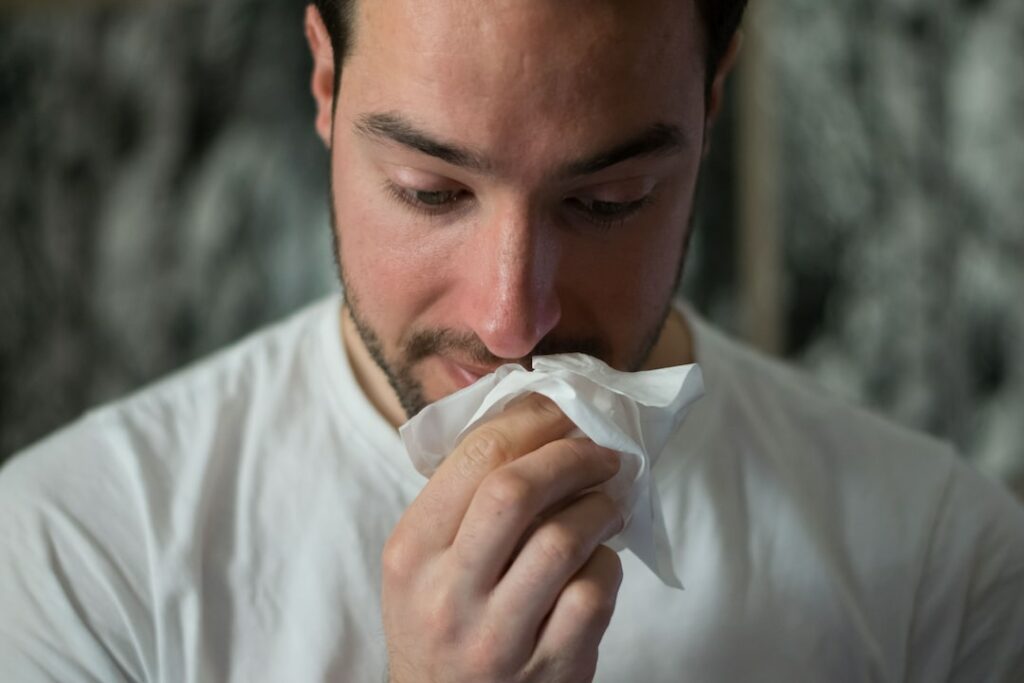Are you wondering why you get morning throat? Find out 6 possible reasons why this happens and what you can do to stop that from happening.
1. Dry Air and Decreased Saliva Production
If you wake up with a sore throat in the morning, it might be because of dry air and less saliva being produced. Dry air can make your throat feel irritated and swollen, causing discomfort and pain.
When the air lacks moisture, it can dry out the sensitive tissues in your throat, making it more likely to get irritated.
Moreover, when you sleep, your body produces less saliva, which also contributes to a dry throat.
2. Lack of Hydration
To avoid a sore throat in the morning, make sure you drink enough water throughout the day. Not drinking enough water can cause your throat to become dry and uncomfortable when you wake up. Keeping your body hydrated and your throat moist is important.
If you have a sore throat that lasts all day, it may mean you’re not drinking enough fluids.

3. Gastroesophageal Reflux Disease (GERD) and Acid Reflux
Do you often feel a burning sensation in your throat when you wake up in the morning? If you do, you might’ve GERD or acid reflux. This happens when stomach acid flows back up into the esophagus, irritating the throat and causing discomfort.
Here are three reasons why GERD could be causing your morning sore throat:
1. Acidic stomach contents: The acid from your stomach can splash back into your throat, causing irritation and soreness.
2. Weakened lower esophageal sphincter (LES): The LES is a muscle that usually prevents stomach acid from flowing back up. If it becomes weak or relaxed, acid reflux can occur.
3. Eating close to bedtime: Eating a heavy meal or spicy foods too close to bedtime can increase the chances of acid reflux while you sleep.
If you wake up with a sore throat often, it’s important to see a healthcare provider who can give you guidance and recommend suitable treatment options.
4. Postnasal Drip and Congestion
Postnasal drip happens when extra mucus drips down your throat, causing a scratchy throat and making you constantly clear your throat. Congestion, on the other hand, leads to a runny or stuffy nose, making it hard to breathe properly. These conditions often occur because of allergies, sinus infections, or the common cold.

5. Snoring and Sleep Apnea
If you snore loudly or often have trouble breathing while sleeping, you may have sleep apnea. Sleep apnea happens when your airway gets partially or completely blocked while you sleep, causing loud snoring and pauses in breathing.
Here are three reasons why snoring and sleep apnea can make your throat hurt when you wake up in the morning:
- Inflammation: Snoring and sleep apnea can make the tissues in your throat vibrate repeatedly and cause inflammation. This can lead to soreness and discomfort.
- Dryness: Snoring and sleep apnea can make you breathe through your mouth, which can dry out your throat and make it sore in the morning.
- Strain on muscles: The effort to breathe against a partially blocked airway can strain the muscles in your throat. This can result in pain and discomfort when you wake up.
If you have snoring and sleep apnea, it’s important to see a doctor to address the underlying causes and find effective treatments for a better, pain-free sleep.
6. Infections and Allergies
If you wake up with a sore throat in the morning, it’s important to understand how infections and allergies can cause this discomfort. Bacterial and viral infections can make your throat feel scratchy and cause pain and irritation. Allergies, on the other hand, can make your throat inflamed due to an immune response.
If you have a bacterial infection, your doctor may prescribe antibiotics. For viral infections, antiviral medications can be helpful. Allergies can be managed by avoiding triggers, keeping clean, and using things like humidifiers or air purifiers. Your doctor may also suggest antihistamines.
How To Prevent Sore Throat?
Preventing a sore throat upon waking involves incorporating simple yet effective habits into your bedtime routine.
Here are some tips to prevent it:
- Stay hydrated throughout the day: Proper hydration keeps the throat moist.
- Consider using a humidifier in your bedroom: This is to prevent throat dryness.
- Avoid excessive consumption of alcohol and tobacco: It can irritate your throat and contribute to discomfort.
- Sleep with an extra pillow or elevate the head slightly: Help minimize acid reflux.
- Maintain good oral hygiene: Brush your teeth and tongue regularly before bed.
These are just some strategies that you may try the next time you feel a sore throat coming. If these does not work, you may want to consider seeing a doctor for proper medical advice.













